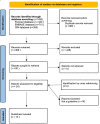Analysis and comparison of clinical practice guidelines regarding treatment recommendations for chronic tinnitus in adults: a systematic review
- PMID: 37714675
- PMCID: PMC10510943
- DOI: 10.1136/bmjopen-2023-072754
Analysis and comparison of clinical practice guidelines regarding treatment recommendations for chronic tinnitus in adults: a systematic review
Abstract
Objectives: To determine if, and to what extent, published clinical practice guidelines for the treatment of chronic tinnitus vary in their recommendations.
Design: Systematic review of guidelines.
Data sources: PubMed, EMBASE and GIN electronic databases were searched in March 2022 and the search was updated in June 2023.
Eligibility criteria: We included clinical practice guidelines that gave recommendations on the treatment of tinnitus. No language restrictions were applied.
Data extraction and synthesis: Two independent reviewers extracted the data and used the AGREE checklist to report on reporting.
Results: A total of 10 guidelines were identified and included, published between 2011 and 2021. Recommendations for 13 types of tinnitus treatments were compared. Large differences in guideline development and methodology were found. Seven of the 10 guidelines included a systematic search of the literature to identify the available evidence. Six of the 10 guidelines used a framework for the development of the guideline. Reporting was poor in multiple guidelines. Counselling and cognitive behavioural therapy were the only treatments that were recommended for treating tinnitus associated distress by all guidelines that reported on these topics. Tinnitus retraining therapy, sound therapy, hearing aids and cochlear implantation were not unanimously recommended either due to the lack of evidence, a high risk of bias or judgement of no beneficial effect of the specific treatment.
Conclusions: There were notable differences with respect to whether guidelines considered the available evidence sufficient enough to make a recommendation. Notably, we identified substantial differences in the rigour of guideline design and development. Reporting was poor in many guidelines. Future guidelines could benefit from the use of reporting tools to improve reporting and transparency and the inclusion of guideline experts and patients to improve the quality of clinical practice guidelines on tinnitus.
Keywords: Otolaryngology; Protocols & guidelines; Systematic Review.
© Author(s) (or their employer(s)) 2023. Re-use permitted under CC BY-NC. No commercial re-use. See rights and permissions. Published by BMJ.
Conflict of interest statement
Competing interests: None declared.
Figures
Similar articles
-
The future of Cochrane Neonatal.Early Hum Dev. 2020 Nov;150:105191. doi: 10.1016/j.earlhumdev.2020.105191. Epub 2020 Sep 12. Early Hum Dev. 2020. PMID: 33036834
-
Sound therapy (using amplification devices and/or sound generators) for tinnitus.Cochrane Database Syst Rev. 2018 Dec 27;12(12):CD013094. doi: 10.1002/14651858.CD013094.pub2. Cochrane Database Syst Rev. 2018. PMID: 30589445 Free PMC article.
-
Clinical practice guideline: tinnitus.Otolaryngol Head Neck Surg. 2014 Oct;151(2 Suppl):S1-S40. doi: 10.1177/0194599814545325. Otolaryngol Head Neck Surg. 2014. PMID: 25273878
-
Cognitive behavioural therapy for tinnitus.Cochrane Database Syst Rev. 2020 Jan 8;1(1):CD012614. doi: 10.1002/14651858.CD012614.pub2. Cochrane Database Syst Rev. 2020. PMID: 31912887 Free PMC article.
-
[On the interdisciplinary S3 guidelines for the treatment of chronic idiopathic tinnitus].HNO. 2015 Jun;63(6):419-27. doi: 10.1007/s00106-015-0011-z. HNO. 2015. PMID: 26054729 German.
Cited by
-
Easing the Burden of Tinnitus: A Narrative Review for Exploring Effective Pharmacological Strategies.Cureus. 2024 Feb 25;16(2):e54861. doi: 10.7759/cureus.54861. eCollection 2024 Feb. Cureus. 2024. PMID: 38533154 Free PMC article. Review.
-
Association Between High Jugular Bulb and Sudden Sensorineural Hearing Loss: A Computed Tomography Based Study.Int J Gen Med. 2025 Jun 26;18:3413-3422. doi: 10.2147/IJGM.S528446. eCollection 2025. Int J Gen Med. 2025. PMID: 40600133 Free PMC article.
-
Frontal gamma-alpha ratio reveals neural oscillatory mechanism of attention shifting in tinnitus.iScience. 2025 Feb 4;28(3):111929. doi: 10.1016/j.isci.2025.111929. eCollection 2025 Mar 21. iScience. 2025. PMID: 40040811 Free PMC article.
-
Continuous Improvement of Chronic Tinnitus Through a 9-Month Smartphone-Based Cognitive Behavioral Therapy: Randomized Controlled Trial.J Med Internet Res. 2025 Feb 18;27:e59575. doi: 10.2196/59575. J Med Internet Res. 2025. PMID: 39965780 Free PMC article. Clinical Trial.
-
The Current State of Tinnitus Diagnosis and Treatment: a Multidisciplinary Expert Perspective.J Assoc Res Otolaryngol. 2024 Oct;25(5):413-425. doi: 10.1007/s10162-024-00960-3. Epub 2024 Aug 13. J Assoc Res Otolaryngol. 2024. PMID: 39138756 Free PMC article. Review.
References
Publication types
MeSH terms
LinkOut - more resources
Full Text Sources
Medical

